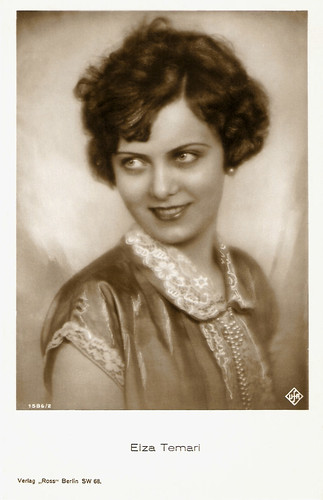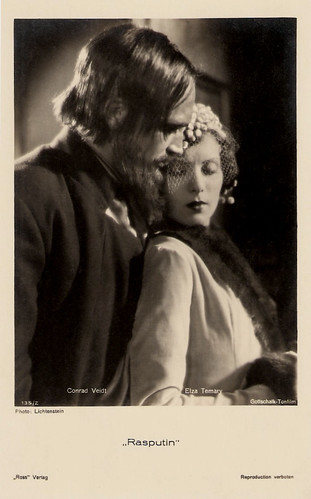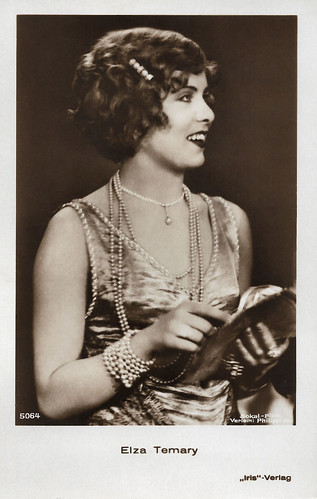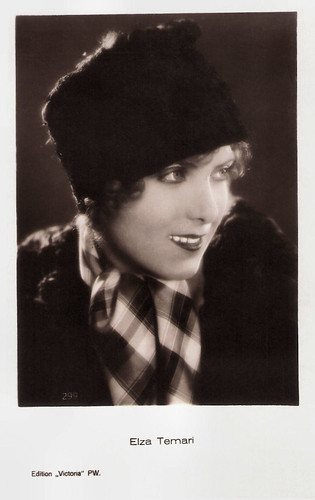
German postcard by Ross Verlag, Berlin, no. 1586/1, 1927-1928. Photo: Ufa.

German postcard by Ross Verlag, Berlin, no. 1586/2, 1927-1928. Photo: Ufa.
Adam and Eve
Elza Temary or Elsa Temari (and variations) was born Elza Klecker in Temeswar, Austria-Hungary (today Timișoara, Romania) in 1905.
One of her first films was the crime film Harry Hill im Banne der Todesstrahlen/Harry Hill under the spell of the death rays (Valy Arnheim, 1925), an episode in the Harry Hill series. The film was forbidden for unknown reasons and was probably never shown in a theatre.
She had a big supporting part in the silent drama Unser täglich Brot/Our Daily Bread (Constantin J. David, 1926) starring Fritz Kampers, Mary Nolan and Dina Gralla. She played the female lead in the silent crime film Der Bettler vom Kölner Dom/The Beggar from Cologne Cathedral (Rolf Randolf, 1927) starring Henry Stuart.
She co-starred with Reinhold Schünzel in the silent comedy Adam und Eva/Adam and Eve (Rudolf Biebrach, 1928). Then followed the comedy Gefahren der Brautzeit/Dangers of the Engagement Period (Fred Sauer, 1930) starring Marlene Dietrich and Willi Forst. It was Dietrich's last film before her breakthrough role in Der blaue Engel/The Blue Angel (Josef von Sternberg, 1930), which made her an international star and led to her departure for Hollywood.
Temary played a spy in the drama Rasputin, Dämon der Frauen/Rasputin, Demon with Women (Adolf Trotz, 1932) starring Conrad Veidt in the title role. It portrays the influence wielded by Grigori Rasputin over the Russian Royal Family around the time of the First World War. It was released the same year as an American film about him, Rasputin and the Empress (Richard Boleslawski, Charles Brabin, 1932), starring Lionel Barrymore as Rasputin and his sister Ethel Barrymore as the Empress.

German postcard by Ross Verlag, Berlin, no. 51/5. Photo: Koop-Film, Berlin. Walter Slezak as Walter Thiermann, engineer of Franz Großmann, surrounded by his old mother (Frida Richard), his beloved Maria (Maria Zelenka), and his sister Renate (Elza Temary) in Die Wacht am Rhein. Aus des Rheinlands Schicksalstagen/The Watch on the Rhine. From the fateful days of the Rhineland (Helene Lackner, 1925-1926). Elza is misspelt as Elga here.

German postcard by Ross Verlag, no. 135/2. Photo: Lichtenstein / Gottschalk Tonfilm. Conrad Veidt and Elza Temary in Rasputin, Dämon der Frauen / Rasputin (Adolph Trotz, 1932). Conrad Veidt plays the legendary mystic who ruled the czarist court in its last years, as the czarina hoped he could heal her son's haemophilia. In the end, he was murdered in 1916 by a number of aristocrats, but not before predicting the downfall of the regime.
A socialite wife
Elza Temary's film career in Berlin ended abruptly as Hitler took power. In 1933, she left Germany on board the passenger steamer Albert Ballin.
She married American wildlife photographer/socialite Philip Chancellor in London. The couple moved to Montecito, California, next to Santa Barbara. As Elza Chancellor, she was then occasionally in the press as a socialite and as Philip's wife.
The Chancellors later moved to Los Angeles and in 1937 to Beverly Hills. In 1937-1938, Elza's husband, Philip was a witness in a trial. A British man, an alleged Nazi, was accused of attempting to extort money from Philip.
Allegedly, the man wanted to fund the assassination of 24 prominent Hollywood Jews. The accused man was allowed to quickly leave the country and return to England.
After World War II, the Chancellors divorced and in 1946, Elza married Howard S. Splane. In 1956, the couple relocated to Tucson, Arizona. There, Elza Temary died in 1968. Her husband had passed away a year earlier.

Austrian postcard by Iris Verlag, no. 5064. Photo: Sokal-Film / Verleih Philipp & Co. Elza Temary acted in the German Sokal-Film production Die Spielerin/Chance the Idol (Graham Cutts, 1927), starring Jack Trevor and Agnes Esterhazy. Graham Cutts was working in Germany at the time for Gainsborough Pictures. Romanian-born German producer Harry R. Sokal was married to Esterhazy, who had the female lead or major supporting parts in several of his films from the 1920s.

Polish postcard by Edition Victoria, no. 299.
Sources: Wikipedia (German and English) and IMDb.
No comments:
Post a Comment